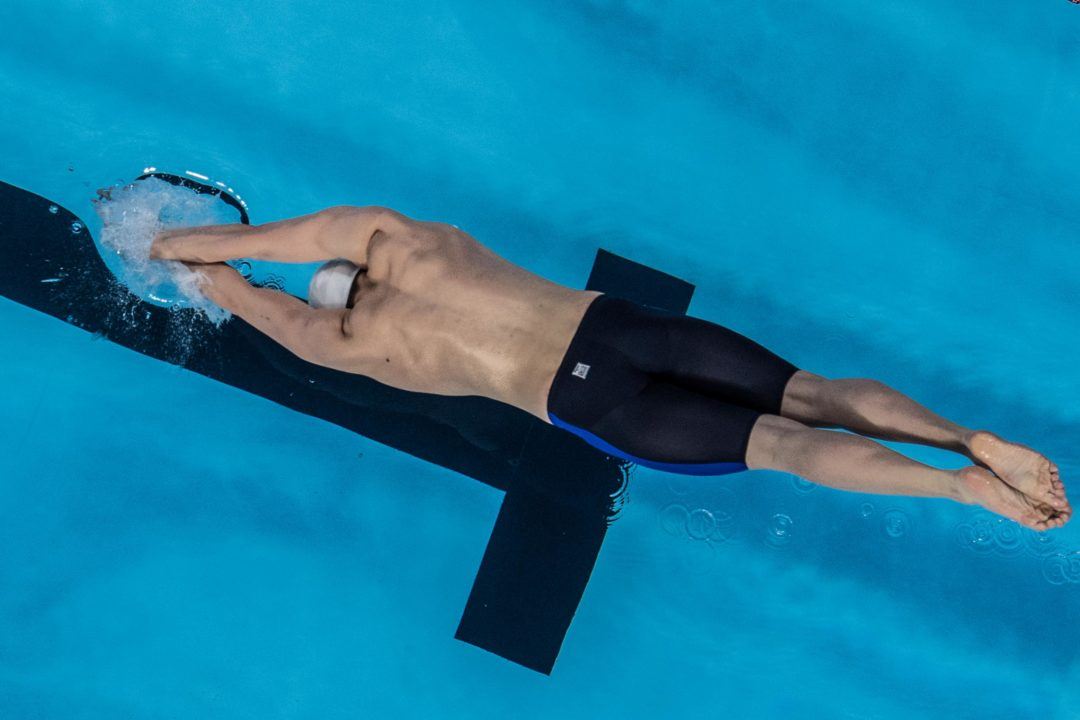Courtesy of Todd Larlee
This is the question many triathletes ask themselves at this time of year. When reading the different articles on the “off-season” at this time of year the most common advice is to work on a weakness. Most triathletes will immediately think of the swim leg. Since 2011, I have spent the months of November & December working on the “traditional” aspects of “improving technique.” Below is my short discourse on technique/swim mechanics being incorporated into practice for age group triathletes.
A couple of things to preface this article-
1. There is nothing that can replace working with a coach on deck that has triathlon or open water coaching experience. Swimming in pool events is different from coaching triathletes or open water swimmers.
2. Most triathletes and adult onset swimmers need to be careful with using power producing or drag increasing equipment. Examples are paddles, an ankle band, an Eney Buoy with any water inside or a parachute. My prerequisites for using these type of equipment are a swim history-defined as swimming consistently for at least 3x/week for 48-50 weeks per year for at least 2-3 years or swimming faster than 1:30/100 yds. Or growing up swimming into high school or college. Even still, there is nothing can replace the advice and watchful eye of a knowledgeable open water swim coach.
Here is a short list of what I think the drawbacks of working on traditional technique & drills are:
1. The lack of athletic awareness of where their body is in the water as well as individual parts of their body. For example, when trying describe to people to push water with their palm towards the opposite wall from the direction they are going I frequently see swimmers pushing water upwards. No matter how I try to phrase this I cannot elicit the change in hand position that I would like.
2. Does two months of working on technique elicit the changes needed to make a difference in technique? Does three? My guess is no.
3. People expect that with “better” technique comes faster swim times or ease of swimming. *Perhaps* over time-but definitely not right away.
4. As my mentor Tower 26 coach Gerry Rodrigues has talked about endlessly, the AG triathlete simply does not have the time to swim 5-7x/week to incorporate daily/weekly technique work. And even if they could-is it the best use of their time?
5. Is there a transfer of technique/drill work to their swimming when they start swimming a set of 10×100(or insert set here) on a set interval at 80-85% or high aerobic effort or race pace effort? Again-I don’t think so. At that point, the athlete is only trying to make the interval without getting completely out of breath.
Do I see any good points about working with drills at any time during the season? The thought is that doing drills can provide a mental( a huge component) and physical break from regular training. Instead of interval training or having that Ironman swim in the back of your mind as you log swim after swim, there is a relaxation that an athlete can “just swim” to focus on one or two points of their stroke.
Todd Larlee is a triathlon coach based out of Cape Elizabeth,  Maine. Todd runs Coast Endurance which provides coaching services to endurance athletes. Todd was mentored by Gerry Rodrigues of Tower 26 based out of Los Angeles, California for five years.
Maine. Todd runs Coast Endurance which provides coaching services to endurance athletes. Todd was mentored by Gerry Rodrigues of Tower 26 based out of Los Angeles, California for five years.

Those of us responding negatively to this article are disagreeing with the implication that drill work is somehow “relaxing” and “just swimming” and not actually a extremely valuable and vital element of a training program, even for (and even ESPECIALLY for) Age Groupers with limited time. Drills can be just as grueling (if not more) as a hard aerobic set, as many are designed to challenge muscle memory at the same time as trying to rewire the brain and body to something new. EVERY swimmer I know who has made marked pace improvements would VISCERALLY disagree with almost every one of the 5 points above, with testimonial to back up their cases.
Well hey, at least you have anecdotal evidence that refutes the author’s anecdotal evidence.
That’s all any of us have, BSGLS. When we see advice being given that counters our own experience and that of literally hundreds of other athletes and coaches we have known spanning a lifetime of competition, we have a right and dare I say an obligation to put out a counterargument in a public forum. We could also start referecing stacks of hard science about hydrodynamics and metabolic efficiency based on perfected form that only comes from… oh yeah… drills.
I’ve now been swimming with Todd just over a year after 4 years of masters, where I plateaued after the 2nd. Our workouts have shown me where my stroke needs work intrinsically and I’ve gone from a threshold pace of 1:16-1:17/100 yd down to about 1:10-1:11 in a year. Furthermore I can feel I’m developing the deep sport specific strength required to go through a triathlon swim and emerge fresher for the bike and run. Last year’s 70.3 and long course races were the least taxing swims I’ve ever been through and I took 8 minutes of my 70.3 PR. (4:20:xx to 4:12:xx)
Flame on all you want, you’re only helping my race!
I’m weighing is as a 30 year veteran of competitive pool and marathon swimming and 70.3 triathlete, who bought this same broken line of logic for most of my swimming career. Yeah, I got fast, but I plateaued and found myself repeatedly injured: wrists, shoulders, back, etc. In 2016, I shifted my focus to form, many months of focus on technique with instruction from clinics deeply rooted in drills and breaking your thinking on all you think you know. I had to throw out everything I thought I knew, and for ditching that arrogance, I am swimming 10-15% faster today, injury free. So by all means, keep spinning out garbage yardage if that makes you happy. You’ll never know the… Read more »
Drills can indeed help, but they have to be held accountable to race improvements. I have drills and equipment that I have proven to improve performance that day. But I have also used equipment and drills that, even when mastered, had no appreciable positive effect on performance. I have never stopped working on proving the value of new equipment and drills, ways of teaching, and perfecting — reducing resistance, building flexibility and fitness, etc. But, is a kickboard able to make a faster swimmer? No. Is a set of 10 x 100’s? Not by itself. There is indeed an art to coaching. But without measuring the effects of what we do to improve, it’s all just words. And, to complicate… Read more »
I think some of you are missing the point — of course swimmers should be mindful of technique every time they touch water, but it’s not necessary to dedicate extensive time to drilling at the expense of actual swimming. Especially for Age Groupers who don’t have much time to swim in the first place.
I live in Ironman-centric Madison, WI, where there are plenty of triathlon shamans. Todd, stay where you are, because you have less competition. There are fewer “magic bullet” seekers, but you can charge higher fees. You’ll make the same amount of money with less work (and more time to “train”).
Gonna preface this by saying I am not a triathlete / open water coach. But everything below seems universally wrong and bad and I’m about to sound really mean, even though I am, somehow, trying to be constructive.
1. The lack of athletic awareness of where their body is in the water as well as individual parts of their body. For example, when trying describe to people to push water with their palm towards the opposite wall from the direction they are going I frequently see swimmers pushing water upwards. No matter how I try to phrase this I cannot elicit the change in hand position that I would like.
This is baffling. First, that’s on you. If your swimmers… Read more »
Wow! I have never read an article on SwimSwam with which I disagree more. Technique is not something any swimmer should work on for two or three months out of the year. It is an every day, every lap, every stroke thing. Most triathletes, in particular, would benefit from focusing things like streamlined body position, hip and shoulder rotation, and proper pull, rather than pounding out yardage with poor form. As Gary Hall likes to point out, water is almost 800 times more dense than air. Improving body position alone would dramatically improve most “adult onset swimmers.”
I completely agree. Gonna go a bit more in depth in a new comment below but yeesh.
Agree wholeheartedly OldTigerimer. I read this article twice as I could not believe what I thought I read the first time. In all my years of swimming from age group to world champion marathon swimmer and now swim coach, swimming technique has always been an every day key to swimming improvement.